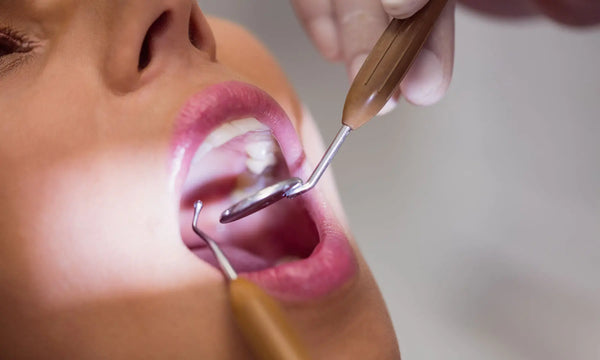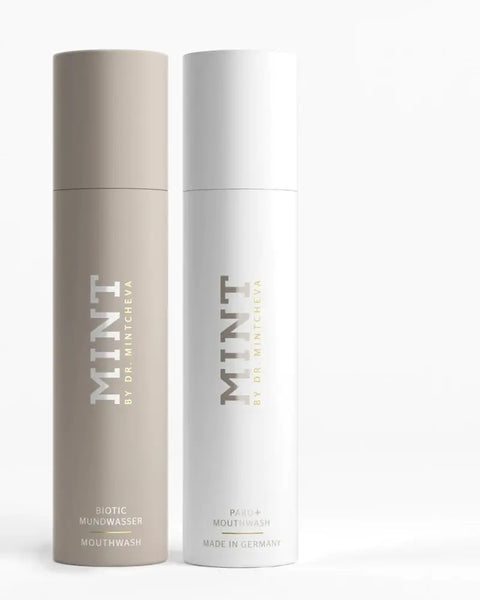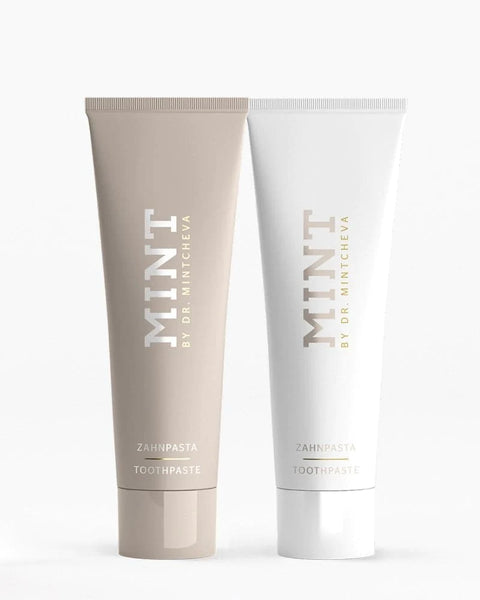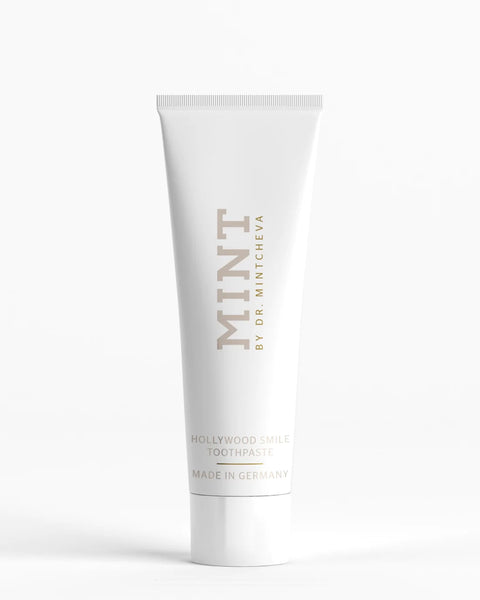Our radiant smile gives us self-confidence every day. However, tartar can tarnish that smile and seriously endanger our dental health. In this guide, we explain everything about tartar, reveal how it forms, and offer practical tips for preventing and combating it, from the right toothpaste to professional teeth cleaning. We provide you with the information you need to keep your smile healthy and bright. Because it deserves only the best, and we're here to make sure it stays that way.
What is tartar?
Tartar, also known as calculus, is a hard, yellowish-brown deposit on the teeth. It is caused by the mineralization of plaque, a sticky substance that forms from bacteria, saliva and food particles and accumulates on the teeth. If plaque is not thoroughly removed the minerals it contains solidify in saliva, and form tartar. This happens surprisingly quickly; within just a few weeks, the stubborn plaque can form, which, among other things, causes bad breath.
What causes tartar teeth?
The formation of tartar is a fascinating process that many people do not fully understand. First, plaque forms on the teeth, where bacteria settle. These bacteria produce acids that attack the minerals in saliva and harden the plaque. In other words, it is the solidification of plaque that adheres to the teeth.
Simply put, without dental plaque, there is no tartar. Plaque is formed from a combination of saliva, bacteria, and food particles (usually carbohydrates) and provides the perfect breeding ground for bacteria to adhere to the teeth or dentures. From there, the plaque continues to grow as more and more bacteria settle on it. This progressive deposit eventually develops into tartar.
There are several types of tartar, including supragingival tartar, which forms above the gum line, and subgingival tartar, which forms below the gum line.
Is tartar bad? – What if it goes untreated?
Especially if the tartar is hidden and forms below the gum line, if left untreated, it can have serious consequences. It promotes the development of gingivitis, an inflammation of the gums that is accompanied by reddened gums and bleeding gums. If left untreated, gingivitis progresses to periodontitis, where the inflammation spreads to the bone around the teeth. This bone loss can lead to early tooth loss, highlighting the importance of tartar removal and prevention.
Tartar removal; this is how it works professionally
Professional teeth cleaning is the most effective way to remove tartar. During this process, the dentist uses special tools, including ultrasonic devices, to gently remove tartar from the teeth. The procedure is usually painless and helps prevent gum disease. It is advisable to keep regular dental appointments so that tartar can be detected and removed early. Dentists recommend having your teeth professionally cleaned at least twice a year. This effectively prevents the development of tooth decay and gum inflammation.

Removing tartar on teeth at home?
Unfortunately, there are no effective home remedies for removing tartar that has already formed. Tartar removal requires special tools and techniques that must be performed by a dentist or dental hygienist. This professional teeth cleaning is the only effective method to safely and gently remove tartar without damaging tooth enamel.
Home remedies such as baking soda or vinegar cannot effectively dissolve or remove tartar. In fact, such home remedies can actually damage tooth enamel and should be avoided.
Remove tartar yourself?
Removing tartar on your own at home is not recommended. The reason for this is that there is a risk of tooth and gum damage if you improperly use tools that are not intended for tartar removal. Using sharp objects can damage tooth enamel and lead to infection. Therefore, tartar removal should always be carried out by professionals such as a dentist or dental hygienist. Remember, tooth enamel is 1.00 mm to 1.5 mm thin and is the layer that protects the tooth from pain sensitivity. When tooth enamel is destroyed, teeth become sensitive to pain and susceptible to tooth decay. That's why teeth should always be treated professionally and safely by the dentist.
Preventing tartar: oral hygiene is the be-all and end-all
Preventing tartar buildup is crucial to preventing tooth damage and gum disease. Efficient oral hygiene is key. Here are some steps to prevent tartar buildup:
Brushing your teeth regularly
Brush your teeth at least twice a day with a suitable toothpaste. Make sure to thoroughly clean all surfaces of your teeth, including the spaces between your teeth. The toothpaste should be able to effectively remove dental plaque. This means cleaning the tooth efficiently, with a high level of cleaning performance. At the same time, the tooth enamel should be protected. Be sure to pay attention to the RDA value of the toothpaste. This describes the abrasion of the toothpaste on the tooth enamel, which should be in the low to medium range.

Use of dental floss
Floss or use interdental brushes daily to remove plaque and food particles from between teeth. Where it's difficult to reach with a toothbrush. Antibacterial mouthwash can also help prevent dental plaque, especially in the spaces between teeth.
Mouthwash
Use an antibacterial mouthwash. This helps reduce bacteria in the mouth, preventing the formation of plaque and ultimately the formation of tartar.
MINT mouthwash Biotic & MINT mouthwash Paro+

Regular dental visits
Schedule regular dental appointments so that your dentist can identify the condition of your teeth and the signs of tartar in a timely manner. Regular professional teeth cleaning at the dentist reliably prevents tartar. You should treat your teeth to this spa treatment at least twice a year.
Proper oral hygiene, coupled with a balanced diet and avoiding smoking, contributes significantly to the prevention of tartar. By incorporating these habits into your daily routine, you can protect the health of your teeth and avoid tartar.
Toothpaste against tartar
An effective toothpaste plays a crucial role in preventing tartar buildup. The secret lies in their efficiency. When a toothpaste efficiently cleans teeth, it not only removes food particles and impurities, but also harmful bacteria that accumulate in plaque. The plaque, the precursor to tartar, is thus effectively combated, and the formation of tartar is prevented.
All MINT toothpastes are equipped with MPT1 Ultra Polish Technology © and are therefore extremely effective in the fight against tartar. This technology is able to not only remove stubborn deposits, but also reduce plaque bacteria. Using our toothpaste not only keeps the surface of the teeth clean but also eliminates the basis for tartar formation. In this way, oral hygiene becomes a proactive line of defense against tartar formation. An efficient toothpaste is therefore an essential part of oral care in order to maintain dental health in the long term.
To the MINT toothpastes

Tip for tartar prevention: the power of MINT Hollywood Smile toothpaste
In addition to the innovative MPT1 Ultra Polish Technology©, the MINT Hollywood Smile toothpaste contains another essential active ingredient that nips tartar in the bud. It contains the important pyrophosphate, which lies on the surface of the tooth and forms a protective layer there. This prevents bacteria from sticking to the teeth and thus deprives plaque of the basis for growth and prevents tartar from forming.
That means: What's special about this toothpaste is that it doesn't just aim to prevent tartar by reducing bacteria. It also has a preventive effect by preventing bacteria from even finding a target on the teeth. A great side effect, Hollywood Smile toothpaste is also proven to whiten your teeth.
Click here for the MINT Hollywood Smile toothpaste

Conclusion: Tartar on teeth - prevention, treatment and care for dental health
Tartar is not just an aesthetic problem; it poses significant risks to dental health. Untreated tartar can cause gum inflammation, which leads to the dreaded periodontitis and even tooth loss.
So, what helps against tartar? – Prevention!
Oral hygiene is the key to preventing tartar buildup and maintaining dental health. Tartar may be tough, but prevention is the surest way to ensure it doesn't form in the first place.
Choosing the right toothpaste with efficient cleaning agents and special ingredients is of great importance. And please do not remove the tartar yourself at home, as this poses a high risk of injury.
Invest in your oral health now, and tartar won't have a chance to tarnish your smile.

Good to know
Bacteria that live in tartar have been found on heart valves, artificial joints, and other endoprostheses. The focus is on these bacteria as being responsible for the fact that artificial joints can become inflamed. The bacteria from the tartar dissolve and enter the bloodstream via the gum pocket. Yet another reason to pay attention to good dental hygiene.




